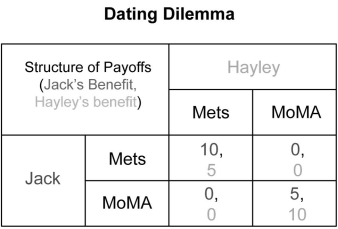Scenario: Consider the following non-cooperative, simultaneous-move game where each player knows her own and her opponent's payoffs. This game is called the dating dilemma. Hayley and Jack are a couple deciding what to do on a Saturday afternoon in the summer. Hayley wants to go to the Museum of Modern Art (MoMA) , while Jack wants to go to a New York Mets game. Neither Jack nor Hayley will derive any benefit from going to their preferred activity without their partner. The payoff matrix for this game is presented below.

-Refer to the scenario above.Are there any Nash equilibria?
Definitions:
IFRS
International Financial Reporting Standards, which are a set of accounting standards developed by the International Accounting Standards Board (IASB) and used by companies outside of the United States.
LIFO
Last In, First Out, an inventory valuation method where the last items placed in inventory are the first ones sold.
Link-Chain Method
A statistical method used for adjusting economic or financial time series data for the effects of inflation or other external factors to show real changes over time.
Q35: The U.S.book publishing industry is an example
Q85: If knowing about one outcome does not
Q100: The market implications of taste-based discrimination were
Q112: Ryan and David are two recent high
Q145: If an individual receives $10,000 after 2
Q156: A player has a dominant strategy when
Q162: Which of the following is a possible
Q172: Which of the following markets is likely
Q195: Several businesses and organizations in Hawaii,including hotels,practice
Q236: Employers engaging in _ are trying to